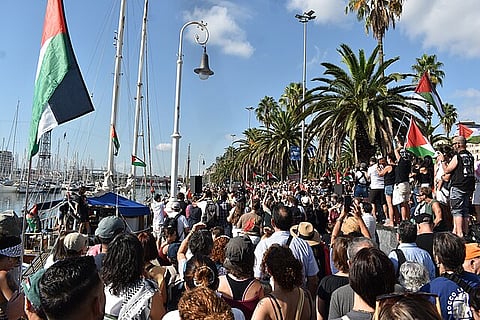

Historic Civilian Mobilization Challenges Israeli Siege
Over 1,000 activists and supporters gathered at Sidi Bou Said port in Tunisia to welcome the Global Sumud Flotilla, a civilian-led aid mission aiming to break Israel’s 18-year illegal blockade of Gaza. The flotilla, which includes Swedish environmental activist Greta Thunberg and French European Parliament member Rima Hassan, represents the largest maritime solidarity effort in history, with participants from 44 countries and more than 50 vessels. Thunberg denounced Israel’s actions as a "genocide" and "mass starvation machine," emphasizing that the mission seeks to open a humanitarian corridor for Gaza’s 2.3 million residents, who face famine conditions exacerbated by Israel’s systematic restriction of aid.
Political Significance and Grassroots Solidarity
The flotilla operates independently of governments, highlighting global civil society’s frustration with diplomatic inaction. Hassan declared, "The Palestinian cause is not in the hands of governments today. It is in the hearts of peoples everywhere," criticizing states for "cowardice" in failing to challenge Israeli policies. The coalition includes groups like the Freedom Flotilla Coalition and Maghreb Sumud Flotilla, which have decades of experience in maritime aid missions. Despite Israeli threats to intercept the vessels, organizers emphasize their commitment to nonviolence and international law, with volunteers undergoing training in de-escalation techniques.
Historical Context and Israeli Repression
Previous flotilla attempts have been met with lethal force. In 2010, Israeli commandos killed 10 activists aboard the Mavi Marmara, while in June 2025, the sailboat Madleen, carrying Thunberg and Hassan was intercepted in international waters, its crew subjected to chemical sprays and detention. Israel’s naval blockade, imposed in 2009, has been condemned by UN experts as illegal and a form of collective punishment, yet it remains enforced with unwavering U.S. support. The flotilla’s aid, though symbolic in volume, challenges the blockade’s legitimacy and highlights Israel’s refusal to allow meaningful humanitarian access.
Humanitarian Crisis and Aid Weaponization
Gaza’s population faces "engineered mass starvation," with the Integrated Food Security Phase Classification (IPC) confirming famine conditions in July 2025. Israel’s blockade has restricted aid to a trickle: only 10% of pre-war food imports enter Gaza, and organizations like CARE and Oxfam report millions of dollars in supplies stranded in Egypt and Jordan due to Israeli bureaucratic obstructions. The flotilla’s cargo includes medical kits, food, and water desalination units, but organizers stress that their primary goal is to expose Israel’s stranglehold on Gaza and force international intervention.
Risks and International Complicity
Activists face significant dangers, including interception, detention, and violence from Israeli forces. National Security Minister Itamar Ben-Gvir has threatened to treat flotilla participants as "terrorists," potentially imprisoning them in high-security facilities where Palestinians are routinely held without trial. The U.S. and EU have largely tolerated Israel’s enforcement of the blockade, with Senator Lindsey Graham tweeting in June 2025, "Hope Greta and her friends can swim!", a statement widely interpreted as endorsing military action against unarmed civilians. Legal scholars argue that Israel’s blockade violates international law, as it fails to distinguish between military targets and civilian necessities.
Path Forward and Moral Imperative
The flotilla aims to reach Gaza by mid-September, though weather and Israeli interference could delay arrival. Its success hinges on global visibility and pressure, with parallel protests planned in 44 countries. As Hamas remains open to ceasefire negotiations, the flotilla underscores the urgency of ending Israel’s siege and upholding Palestinian self-determination. With governments failing to act, civil society movements are becoming the last hope for Gaza’s survival.